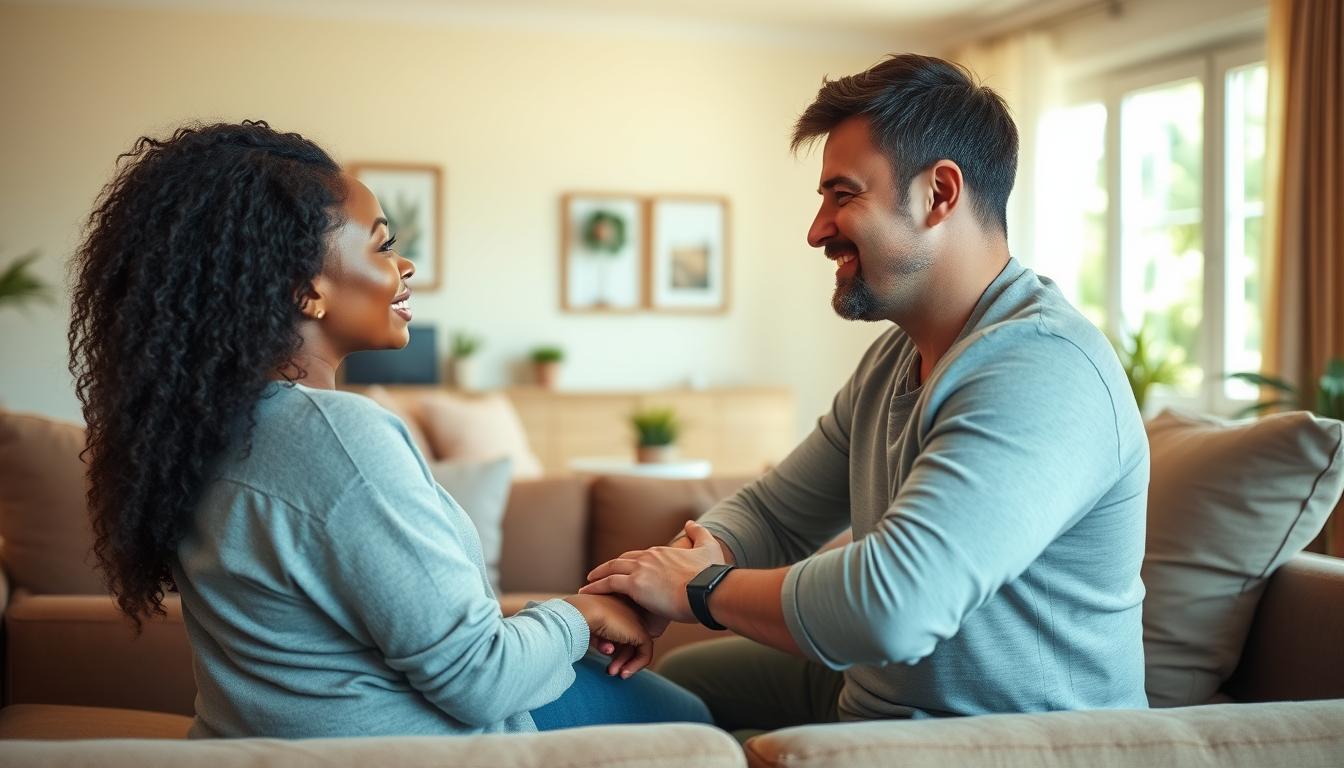Effective Problem-Solving in Relationships
Building a strong and lasting relationship is not just about love and commitment. It also needs healthy communication and the ability to solve problems together.
When both partners can solve challenges effectively, their bond gets stronger. They build a more resilient relationship.
By using the right strategies and techniques, couples can make their relationship better. They can understand each other deeper.
Key Takeaways
- Healthy communication is key to resolving conflicts.
- Active listening can significantly improve relationship dynamics.
- Embracing differences can strengthen a relationship.
- Conflict resolution strategies can be learned and improved.
- Building trust is essential for a resilient relationship.
The Anatomy of Relationship Conflicts
Relationship conflicts involve a mix of emotions, expectations, and communication problems. They can stem from misunderstandings, unmet expectations, and differing opinions. These issues are complex and can affect relationships deeply.
Common Triggers That Lead to Disagreements
Many things can cause disagreements in relationships. These include differences in communication styles, unrealistic expectations, and external stressors like money issues or family problems. Knowing these can help partners manage them better.
Effective conflict management techniques can help manage these triggers. For example, being aware of one’s emotions and taking a break can prevent things from getting worse.
| Trigger | Potential Impact | Mitigation Strategy |
|---|---|---|
| Differences in Communication Styles | Misunderstandings and misinterpretations | Practice active listening and clarify expectations |
| Unrealistic Expectations | Disappointment and frustration | Discuss and adjust expectations to be more realistic |
| External Stressors | Increased tension and conflict | Manage stress through relaxation techniques and support each other |
The Hidden Cost of Unresolved Issues
Unresolved issues can harm relationships in many ways. They can cause resentment, emotional distance, and even break the relationship. The longer these issues are ignored, the harder they are to fix.
By tackling conflicts early and using effective conflict resolution techniques, couples can avoid bigger problems. It’s important to understand the long-term effects of ignoring conflicts to motivate couples to work through their issues.
Building a Communication Foundation
Creating a strong communication base is key to handling conflicts in relationships. It’s the foundation that lets couples tackle problems together. This way, they understand each other’s needs and worries better.
Active Listening: The Key to Understanding
Active listening is a crucial skill. It means focusing fully on what your partner says, getting their point of view, and responding carefully. This makes sure both feel heard and valued, cutting down on misunderstandings that can lead to fights.
Expressing Needs Effectively
It’s important to share your needs without making your partner defensive. You should be clear and direct but also consider their feelings. Using “I” statements instead of “you” helps avoid blame and promotes a better conversation.
Creating a Safe Space for Dialogue
It’s vital to create a safe space for honest talks. This means setting aside time to talk, being mindful of your tone and body language, and showing you’re ready to listen and understand. This way, couples can talk openly, leading to better problem-solving.
| Communication Skill | Description | Benefit |
|---|---|---|
| Active Listening | Fully concentrating on what your partner is saying | Reduces misunderstandings |
| Expressing Needs Clearly | Being direct about one’s needs while being empathetic | Promotes constructive dialogue |
| Creating Emotional Safety | Setting a safe environment for open dialogue | Fosters honest communication |
“The art of conversation is the art of hearing as well as being heard.”
Effective Problem-Solving in Relationships: A Framework
A good framework for solving problems is key to fixing relationship conflicts. By using a structured method, couples can handle disagreements better. This helps make their relationship stronger.
Defining the Real Problem Behind Surface Issues
The first step is to find the real issue, not just the symptoms. Couples should work together to find the root cause. This often involves active listening and empathy.
Collaborative Solution Generation
After finding the real problem, the next step is to come up with solutions together. This means brainstorming and looking at things from different angles. The goal is to find solutions that meet both partners’ needs.
Evaluating Options and Finding Middle Ground
After listing possible solutions, couples should discuss them. They need to talk about the good and bad of each option. Finding a middle ground that works for both is important. Effective communication is crucial here to make sure both feel heard.
By using this framework, couples can get better at solving problems. It’s about teamwork, being open to different ideas, and finding a solution that works for both.
Managing Emotions During Conflict Resolution
Effective conflict resolution is all about managing emotions during tough talks. When couples handle their feelings well, they often find a solution that makes their bond stronger.
Managing emotions means understanding and dealing with them in a healthy way. It’s about knowing what triggers anger and finding ways to calm down.
Taming Anger and Frustration in the Heat of Disagreement
Anger and frustration are common in conflicts. But, letting them control the conversation can block progress. Using deep breathing, temporary separation, and self-reflection can help calm things down.
Creating a pause lets people think before they speak. This way, they can respond more thoughtfully, avoiding impulsive reactions.
Recognizing and Overcoming Defensive Patterns
Defensiveness is natural when we feel attacked. But, it can make conflicts worse. The first step is to recognize when we’re being defensive.
Being open and receptive helps create a safe space for real talk. This reduces defensiveness and encourages working together to solve problems.
Practical Conflict Resolution Techniques That Transform Relationships
Effective conflict resolution techniques can greatly improve your relationships. By using constructive problem-solving strategies, couples can handle disagreements well. This makes relationships healthier and stronger.
One key technique is taking strategic time-outs. This means stepping away when emotions are high. It helps both partners calm down and think about their feelings.
Strategic Time-Outs: When and How to Take a Break
Time-outs can stop conflicts from getting worse. It’s important to agree on when to talk again. This way, the break doesn’t mean avoiding the issue.
The Power of “I” Statements in Defusing Tension
Using “I” statements instead of “you” statements helps a lot. It reduces blame and defensiveness. This way, people can share their feelings without attacking their partner. It makes healthy communication in relationships better.
Negotiating Win-Win Solutions That Satisfy Both Partners
The aim of solving conflicts is to find a solution that both like. By listening well and looking for common ground, couples can find win-win solutions. This teamwork fosters healthy relationships through problem-solving.
| Technique | Description | Benefit |
|---|---|---|
| Strategic Time-Outs | Taking a break to calm down | Prevents escalation |
| “I” Statements | Expressing feelings without blame | Reduces defensiveness |
| Win-Win Solutions | Finding mutually beneficial solutions | Satisfies both partners |
Strengthening Your Problem-Solving Skills Together
Working together to solve problems can make a relationship stronger. Couples can learn to handle conflicts better by teaming up. This makes their relationship more resilient and adaptable.
Regular check-ins are a great way to improve this. Implementing Regular Relationship Check-ins helps partners tackle issues early. This keeps the relationship open and collaborative.
Implementing Regular Relationship Check-ins
Regular check-ins give couples a chance to talk about their feelings and concerns. It helps spot problems early and keeps the relationship healthy.
Developing Empathy Through Perspective-Taking Exercises
Developing empathy is key for solving conflicts well. Exercises that help partners see things from each other’s point of view are very helpful. They lead to more understanding and better communication.
Breaking Destructive Conflict Cycles
Changing how you interact in conflicts takes effort. Recognizing and challenging negative patterns is important. It helps couples find better ways to solve problems.
Using these strategies, couples can get better at solving conflicts. This strengthens their relationship.
When to Consider Professional Support
Knowing when to ask for help is key in fixing deep relationship problems. Many couples can handle their issues alone. But, some conflicts are too hard to solve without outside help.
Looking for professional advice doesn’t mean you’ve failed. It’s a smart move to make your relationship stronger. Effective conflict management techniques can be learned with the right support.
Red Flags That Indicate You Might Need Outside Help
There are signs that show a couple might need professional help. These include:
- Recurring arguments that never seem to resolve
- A lack of communication or avoiding sensitive topics
- Feelings of resentment or anger that are not addressed
- Trust issues that have not been resolved
If these problems keep happening, it might be time for couples therapy. It’s a way to tackle challenges in a guided setting.
What Couples Therapy Offers and How It Works
Couples therapy is a safe place for partners to discuss their issues. A trained therapist guides them. It offers:
- Tools and strategies for better communication
- Techniques for managing conflict effectively
- A deeper understanding of each partner’s needs and desires
Working with a therapist, couples can learn relationship conflict resolution techniques. This helps build a healthier and more fulfilling partnership.
Conclusion: Building a Stronger Relationship Through Conflict Resolution
Effective problem-solving is key to building a stronger, more resilient relationship. Understanding the root causes of conflicts is important. Employing practical conflict resolution techniques helps couples navigate challenges better.
Healthy communication in relationships is crucial. By fostering an environment where both partners feel heard and understood, couples can improve their relationship dynamics.
Improving relationship dynamics requires commitment and practice. Regular relationship check-ins and empathy through perspective-taking exercises are helpful. These steps can break destructive conflict cycles, leading to a more fulfilling relationship.
Effective problem-solving in relationships is not a one-time achievement. It’s a continuous process that requires effort and dedication from both partners.
By applying the strategies outlined in this article, couples can develop the skills needed to resolve conflicts in a constructive manner. This strengthens their bond and improves their overall relationship satisfaction.







